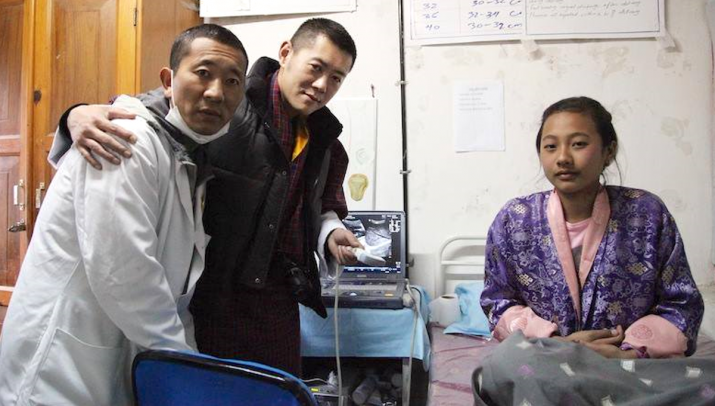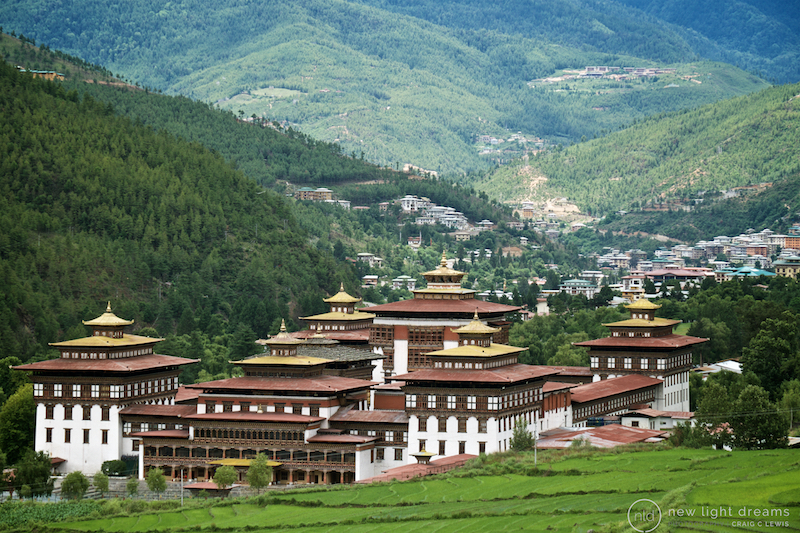NEWS
In Landmark Move, Buddhist Bhutan Gives Teachers, Medics Highest Pay Grade for Civil Servants
 Bhutanese prime minister Lyonchhen Lotay Tshering, left, a trained urologist, has continued to treat patients since taking office. From mothership.sg
Bhutanese prime minister Lyonchhen Lotay Tshering, left, a trained urologist, has continued to treat patients since taking office. From mothership.sgIn a landmark move that underscores its unique approach to economic development, informed by Buddhist values and emphasizing societal happiness and sustainable growth, the government of the Buddhist kingdom of Bhutan has announced a cabinet revision of civil servant pay structures that increases remuneration for educators, doctors, nurses, and other medical workers, and makes teachers the highest-paid civil servants in the country.
“With this huge strategic move, the cabinet has ensured that not only are the professionals paid higher, but it has also overturned the unofficial civil service ‘hierarchy’ where administration officials enjoyed trainings, trips, and other perks,” The Bhutanese newspaper reported. “This is compared to overworked teachers in the same grades who teach the future of Bhutan but may not even have a proper chair to sit on or doctors who are on duty saving lives night and day.” (The Bhutanese)
Remote and landlocked, perched in the rarified air of the eastern Himalaya, Bhutan is regularly ranked among the happiest countries in the world. With a population of just 736,000, according to government data for 2017, it is also one of the world’s smallest and least industrialized countries, yet it has significant experience in maintaining the delicate balance of managing economic growth in a sustainable manner, famously encapsulated in its conservative “Gross National Happiness” (GNH) approach to economic development. Bhutan held its first elections as a constitutional monarchy in 2008.
“If the pay revision comes through as proposed by the government, teaching becomes the highest paid profession in the country,” said the Bhutanese prime minister, 51-year-old Lyonchhen Lotay Tshering,* himself a trained urologist who was sworn in as premier of the Himalayan kingdom in November last year. “As pledged, our focus is on according due motivation to the teachers, while also improving quality of the profession, which in turn will benefit our education system. Salary is just one aspect. As part of our flagship programs, we are also targeting capacity building and career advancement for teachers.” (The Bhutanese)
“But we haven’t disregarded our health workers, who are working relentlessly to take services to the people,” the prime minister added. “They might deserve more and health is this government’s priority but within the limits, we have tried.” (The Bhutanese)
Bhutan’s philosophy of GNH was introduced in the late 1970s by the country’s fourth king, Jigme Singye Wangchuk, drawing inspiration from the kingdom’s traditional Buddhist culture. An alternative to traditional metrics for measuring national development, such as gross national product (GNP) or gross domestic product (GDP), GNH is founded on four underlying principles or “pillars:” good governance, sustainable socio-economic development, the preservation and promotion of culture, and environmental conservation.
While not opposed to material development or economic progress, GNH rejects the pursuit of economic growth as the ultimate good, instead seeking to cultivate a more holistic approach to balanced development and societal well-being, translating cultural and social priorities into developmental goals to create a happier, more equitable society.

Bhutan, the world’s last remaining Vajrayana Buddhist nation, takes a radical approach to economic development, informed by Buddhist values and emphasizing societal happiness and sustainable growth. Photo by Craig Lewis
Health Minister Lyonpo Dechen Wangmo noted that it was essential to focus investment on the education and healthcare sectors to ensure that good teachers and doctors were appropriately compensated to attract and retain the best and brightest. Good teachers will lead to good students, who bear the responsibility of building the nation and having a positive impact on the country’s GNH, the minster emphasized, adding that both the teaching and medical professions had experience high attrition rates in recent years due to long hours and high stress levels.
“We are trying to ensure that our public servants are compensated and incentivized for their responsibilities, and also to ascertain an income that matches economic reality of the country,” a press release from the Prime Minister’s Office stated. (Eleven Media Group)
Nestled in the foothills of the Himalayan mountain range, and sandwiched between two political and economic heavy hitters India and China, Bhutan is the world’s last remaining Vajrayana Buddhist country. The ancient spiritual tradition is embedded in the very consciousness and culture of this remote land, where it has flourished with an unbroken history that dates back to its introduction from Tibet by Padmasambhava, also known as Guru Rinpoche, in the eighth century. Almost 75 per cent of Bhutan’s population identify as Buddhists, according to data for 2010 from the Washington, DC-based Pew Research Center, with Hinduism accounting for the majority of the remainder. Most of Bhutan’s Buddhists follow either the Drukpa Kagyu or the Nyingma schools of Vajrayana Buddhism.
* Lyonchhen is the formal Bhutanese title for the prime minister.
See more
Revolutionary Hike: Education and Health wins as Teachers and Doctors are now the highest paid civil servants (The Bhutanese)
In Bhutan, teachers, medical staff will now be highest paid civil servants (The Indian Express)
Bhutan govt's proposed salary revision (Eleven Media Group)
Related news from Buddhistdoor Global
Buddhist Kingdom of Bhutan Moves to Decriminalize Homosexuality
Buddhist Kingdom of Bhutan Hosts Third International Vajrayana Conference
Bhutan’s Prime Minister Wins Praise and Social Media Fame for Continuing to Practice Medicine
BBC Names Dr. Tashi Zangmo of the Bhutan Nuns Foundation among 100 Most Influential Women of 2018
Bhutan, the World’s Only Carbon-negative Nation, Sets an Example of Environmental Stewardship for a Planet Grappling with Climate Change
Related features from Buddhistdoor Global
My Story: Walking the Path of a Female Monastic in Bhutan
Changing Mindsets: Tashi Zangmo and the Bhutan Nuns Foundation
Happiness Before Profit: Bhutan Seeks to Redefine Business Using Buddhist Values
A Manifestation of Profound Wisdom and Compassion—Remembering Dilgo Khyentse Rinpoche
An Agent of Change: Empowering Bhutanese Nuns














